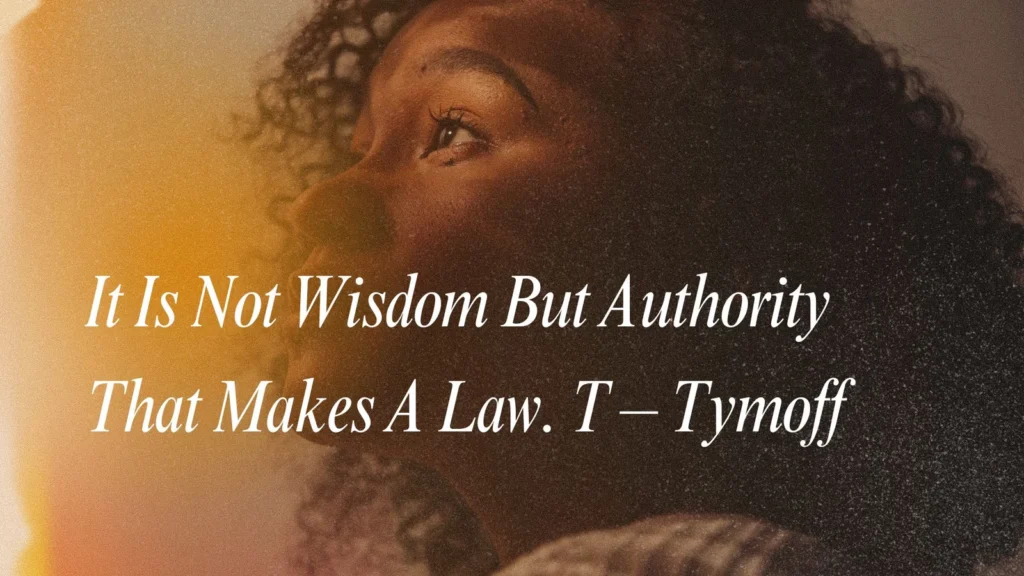The phrase It Is Not Wisdom But Authority That Makes A Law. T – Tymoff challenges our traditional understanding of laws. Typically, we think of laws as grounded in wisdom, made for the greater good. However, this quote brings to light that it is often the authority, not wisdom, that ultimately creates and enforces laws. T. Tymoff’s perspective emphasizes how those in power, such as governments and rulers, use their authority to make laws, shaping societies throughout history. Understanding this dynamic helps us see the balance—or lack thereof—between power and ethical governance.
Table of Contents
Historical Context of Authority in Lawmaking
Laws have been crafted throughout history, often reflecting the power dynamics of their times. Authority has played a crucial role in establishing and maintaining these laws, sometimes at the expense of wisdom and fairness. It Is Not Wisdom But Authority That Makes A Law. T – Tymoff
The Code of Hammurabi is one of the earliest known examples of written law. Established around 1754 BC in ancient Mesopotamia, it was created by Hammurabi, the king of Babylon. The code covered various aspects of daily life, including property rights, family relationships, and criminal justice. What made this code significant was not the wisdom behind it but the king’s authority to enforce it. Hammurabi claimed that the laws were given to him by the gods, giving them a divine mandate.
Despite its historical importance, many of Hammurabi’s laws were harsh and reflected the societal hierarchy. For instance, punishments varied based on social status, favoring the wealthy and powerful over the poor and enslaved. This clearly shows how authority, rather than wisdom or justice, shaped the law. It set a precedent for how rulers could use their power to create and enforce laws, with little regard for equality.
In Ancient Egypt, the Pharaoh was considered a living god, wielding absolute authority over the land and its people. Laws were viewed as decrees from the Pharaoh, believed to maintain the cosmic order, known as Ma’at. The legal system covered everything from agriculture to family life, and these laws were strictly enforced. Pharaohs used their authority to enact laws that upheld their divine rule and reinforced the social order.
The wisdom or fairness of these laws was secondary to their role in sustaining the Pharaoh’s authority and control over society. The Pharaoh’s decrees were followed not because they were necessarily wise or just, but because of the belief in his divine right to rule. This reinforces the idea that authority often supersedes wisdom in lawmaking.
Modern Perspective on Authority and Law
In modern times, authority in lawmaking is primarily held by elected bodies such as parliaments, congresses, and legislatures. These institutions have the formal power to create, amend, and repeal laws. Even though we live in democratic societies where laws are meant to reflect the will of the people, authority often has the final say in what becomes law. Political agendas, lobbying efforts, and party politics can heavily influence the creation of laws, sometimes aligning more with the interests of powerful groups rather than the broader public good.
Judicial systems and regulatory agencies also wield significant authority in interpreting and enforcing laws. Judges and courts have the power to make decisions that set legal norms and practices, ensuring the law is applied consistently. Regulatory bodies like the Environmental Protection Agency (EPA) create rules that have the force of law, impacting millions of people. These agencies often operate without direct public input, raising questions about accountability and transparency. This modern perspective shows that, while we strive for wisdom in lawmaking, authority still plays a dominant role.It Is Not Wisdom But Authority That Makes A Law. T – Tymoff
The Balance Between Wisdom and Authority
Finding a balance between wisdom and authority in lawmaking is essential for creating fair and just societies. While authority ensures laws are enforceable, wisdom ensures these laws are just, ethical, and reflective of societal values. Ideally, lawmakers should consult the public, think ethically, and understand the long-term implications of the laws they create. Incorporating diverse perspectives and expertise can lead to more balanced and thoughtful legislation.
However, this balance is not always achieved. Authority can sometimes overshadow wisdom, leading to laws that favor certain groups over others. Legal realism, a school of thought in jurisprudence, argues that the social, economic, and political context in which laws are enacted is crucial. This perspective challenges the traditional belief that laws are purely based on rational and wise understanding, suggesting that authority often plays a more significant role in shaping legal norms.
Authority as a Means of Enforcement
Authority serves as a crucial means of enforcing laws and maintaining societal order. Those in power have the ability to prevent and address violations of established norms, creating a sense of accountability among citizens. The presence of authoritative figures often acts as a deterrent, dissuading individuals from engaging in unlawful behavior due to the fear of consequences. By possessing the capacity to administer penalties, authorities maintain the integrity of legal systems and promote a culture of compliance.It Is Not Wisdom But Authority That Makes A Law. T – Tymoff
However, the exercise of authority must be balanced with safeguards to prevent its misuse. While authority is necessary for ensuring compliance and maintaining order, it can become tyrannical if unchecked. Transparency, accountability, and an independent judiciary are crucial mechanisms that help maintain this balance. By subjecting authority to scrutiny, societies can preserve individual liberties while upholding the rule of law.
Moral Imperatives vs. Legal Realities
Moral imperatives often come into conflict with legal realities, especially when authority-driven laws do not align with ethical principles. While authority can confer legal validity upon a statute, its alignment with justice and equity remains uncertain. Laws created solely on the basis of authority may lack the ethical foundation necessary to ensure fairness and protect individual rights. This tension between moral imperatives and legal realities highlights the importance of integrating wisdom into the lawmaking process.
Wisdom, unlike authority, emanates from a deeper understanding of ethical principles, transcending societal conventions. It involves discernment between right and wrong, just and unjust, providing a moral compass for legal systems. By seeking a harmonious coexistence between authority and wisdom, we can ensure that laws serve not just the dictates of power but also the dictates of conscience.
Case Studies of Authority Over Wisdom
Authority-driven lawmaking is evident in various historical and contemporary examples. Constitutional law, for instance, is based on the supreme authority of a nation’s constitution, which outlines the powers and limitations of the government. This authority underpins all other laws and ensures that they are systematically and uniformly applied. Statutory law reflects the will of elected representatives, backed by the legal power granted to them. Executive orders issued by leaders demonstrate how authority directly influences lawmaking, often addressing the immediate needs of governance.It Is Not Wisdom But Authority That Makes A Law. T – Tymoff
However, laws made purely on the basis of authority can lead to challenges. For example, laws enacted during authoritarian regimes often served the interests of the ruling class rather than the public good. This authority-driven approach resulted in the suppression of dissenting voices and the curtailment of fundamental liberties. Such examples underscore the need for integrating wisdom into the exercise of authority, creating laws that are not only enforceable but also just and fair.
Conclusion
It Is Not Wisdom But Authority That Makes A Law. T – Tymoff serves as a reminder of the complex relationship between power and justice in lawmaking. While authority plays a pivotal role in the enactment and enforcement of laws, its legitimacy ultimately hinges on the wisdom underpinning its exercise. Striking a balance between authority and wisdom is essential for creating a fair and effective legal system that serves the interests of all members of society. By fostering a symbiotic relationship between the two, we can chart a course toward a more enlightened future, where laws reflect both the power of those in positions of influence and the ethical foundations that underpin a just society.
Read More : Antioch Teacher Halloween Costume Reddit







